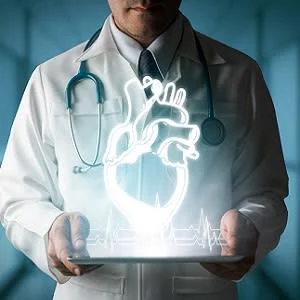The number of cardiologists trained in cardio-oncology, or the treatment of cardiovascular disease in patients treated for cancer, does not currently meet the needs of this rapidly growing population. A review paper published in the Journal of the American College of Cardiology examines the efforts of the cardio-oncology community to provide the education and training needed to deliver high-quality cardiovascular care to cancer patients and survivors.
Cardiovascular disease and cancer are the two main causes of death in the U.S.; however, advances in early detection and treatment of cancer have led to a rise in the number of cancer survivors. It is estimated that by 2026 there will be 20 million cancer survivors and half will be 70 years old or older. The combination of an aging population of cancer survivors with co-morbid cardiovascular disease and growing list of cancer treatments that effect the cardiovascular system have led to the need for cardiovascular specialists with an in-depth understanding of the intersection of these diseases.
"Cardio-oncology is a developing discipline of practitioners who are focused on the prevention, early detection and optimal treatment of cardiovascular disease in patients treated for cancer and who are focused on balancing the cardiovascular and oncologic needs of patients prior to, during and after therapy," said Ana Barac, MD, PhD, director of the cardio-oncology program at Medstar Heart and Vascular Institute in Washington and co-senior author of the paper. "Examples of clinical strategies include pre-therapy risk-stratification and cardiovascular health optimization, personalizing cancer therapy based on the cardiovascular risk profile and the diagnosis and treatment of a widening array of therapy-related cardiovascular complications."
Though limited in number and scope, training programs are emerging to meet the education needs for cardiovascular care providers of patients with cancer. According to a survey by the authors, 51 percent of accredited general cardiology fellowship programs are a part of institutions providing dedicated cardio-oncology services, up from 27 percent in 2014. An additional 33 percent responded that they were planning to add these services in the near future; however, only nine of these institutions that offer cardio-oncology services had training opportunities specific for the field of cardio-oncology.
A 2015 survey in cardio-oncology conducted by the American College of Cardiology identified that a lack of educational resources in cardio-oncology was a barrier to developing training programs. In response, educational resources have been developed to meet the needs of the field, including live courses at national meetings, online resources, clinical practice guidelines and journals, such as the ACC's new journal JACC: CardioOncology, which is set to launch in September 2019.
The authors stress the importance of collaboration in the field of cardio-oncology.
"Traditional care models in which cardiologists and oncologists operate in silos are suboptimal for managing complex cancer patients and lead to fragmented care and variability in assessment and management," said Bonnie Ky, MD, MSCE, associate professor of medicine and epidemiology at the Perelman School of Medicine at the University of Pennsylvania, editor-in chief of JACC: CardioOncology and co-senior author of the paper. "Most importantly, the viability of any cardio-oncology program is dependent on collaborating oncologists who form the referral base."
The authors outline what a training program in cardio-oncology should look like, while also acknowledging roadblocks such as a lack of 1) funding and support, 2) an accreditation process, 3) a formalized training curriculum and 4) evidence of clinical benefit and economic feasibility of interventions.
"Inclusion of cardio-oncology as a component of general cardiology training programs is the first step at establishing a workforce capable of recognizing and managing the complex cardiovascular burdens associated with cancer in every community," Ky said.
Cardiovascular disease and cancer are the two main causes of death in the U.S.; however, advances in early detection and treatment of cancer have led to a rise in the number of cancer survivors. It is estimated that by 2026 there will be 20 million cancer survivors and half will be 70 years old or older. The combination of an aging population of cancer survivors with co-morbid cardiovascular disease and growing list of cancer treatments that effect the cardiovascular system have led to the need for cardiovascular specialists with an in-depth understanding of the intersection of these diseases.
"Cardio-oncology is a developing discipline of practitioners who are focused on the prevention, early detection and optimal treatment of cardiovascular disease in patients treated for cancer and who are focused on balancing the cardiovascular and oncologic needs of patients prior to, during and after therapy," said Ana Barac, MD, PhD, director of the cardio-oncology program at Medstar Heart and Vascular Institute in Washington and co-senior author of the paper. "Examples of clinical strategies include pre-therapy risk-stratification and cardiovascular health optimization, personalizing cancer therapy based on the cardiovascular risk profile and the diagnosis and treatment of a widening array of therapy-related cardiovascular complications."
Though limited in number and scope, training programs are emerging to meet the education needs for cardiovascular care providers of patients with cancer. According to a survey by the authors, 51 percent of accredited general cardiology fellowship programs are a part of institutions providing dedicated cardio-oncology services, up from 27 percent in 2014. An additional 33 percent responded that they were planning to add these services in the near future; however, only nine of these institutions that offer cardio-oncology services had training opportunities specific for the field of cardio-oncology.
A 2015 survey in cardio-oncology conducted by the American College of Cardiology identified that a lack of educational resources in cardio-oncology was a barrier to developing training programs. In response, educational resources have been developed to meet the needs of the field, including live courses at national meetings, online resources, clinical practice guidelines and journals, such as the ACC's new journal JACC: CardioOncology, which is set to launch in September 2019.
The authors stress the importance of collaboration in the field of cardio-oncology.
"Traditional care models in which cardiologists and oncologists operate in silos are suboptimal for managing complex cancer patients and lead to fragmented care and variability in assessment and management," said Bonnie Ky, MD, MSCE, associate professor of medicine and epidemiology at the Perelman School of Medicine at the University of Pennsylvania, editor-in chief of JACC: CardioOncology and co-senior author of the paper. "Most importantly, the viability of any cardio-oncology program is dependent on collaborating oncologists who form the referral base."
The authors outline what a training program in cardio-oncology should look like, while also acknowledging roadblocks such as a lack of 1) funding and support, 2) an accreditation process, 3) a formalized training curriculum and 4) evidence of clinical benefit and economic feasibility of interventions.
"Inclusion of cardio-oncology as a component of general cardiology training programs is the first step at establishing a workforce capable of recognizing and managing the complex cardiovascular burdens associated with cancer in every community," Ky said.
Source: American College of Cardiology
Image Credit: iStock
Latest Articles
Cancer, cardiovascular disease, cardiooncology
A review paper published in the Journal of the American College of Cardiology examines the efforts of the cardio-oncology community to provide the education and training needed to deliver high-quality cardiovascular care to cancer patients and survivors.










